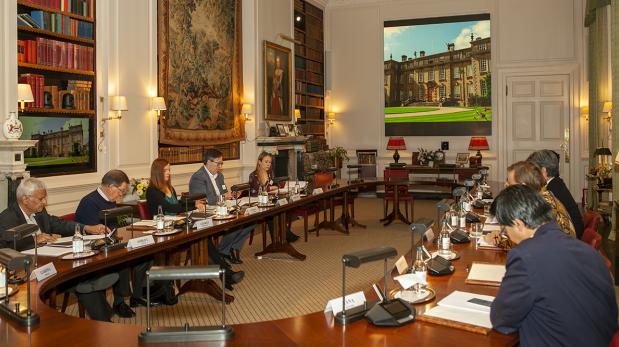
Among the main themes, captured in the Ditchley community debrief, from the conference on The Indo-Pacific: how can we best promote strategic stability, economic growth and the rule of law in the region?, held on the 22 October 2021, were:
Certain assumptions previously held about peace and stability in the Indo-Pacific have been proved incorrect. We assumed that greater trade integration would lead to greater stability; we assumed China would converge when it became a member of the WTO twenty years ago. However, we have seen the decline of democracy and twenty years on the WTO has made for a forum for dispute rather than for resolution.
China has shifted its economic strategy to focus on high value-add, which brings it into direct competition with superpowers. We see China as needing to be tempered, but this view is unhelpful and fuels aggressive rhetoric. It is particularly unhelpful for other countries in the Indo-Pacific who feel uncomfortable about the attempt to contain China, this leading to regional polarisation.
Creating divisions between the issues we are talking about. Very large numbers of countries will speak up in terms of concern on domination by China, but will not speak up in terms of internal values. We need to delink values questions on human rights (those we cannot much influence) from those to do with territory, maritime and boundaries – and then we might make more progress.
The Indo-Pacific is bigger than China. The smaller countries in the region do not want to be dominated by rivalry between China and the West. How can we layer different types of relationships – CPTPP, ASEAN, QUAD – to create a pathway through the rivalry and keep space for these countries to manoeuvre? The CPTTP could be a possible arena of cooperation on rules-based trade, effective supply chain building, digital supply chain and regulation too.
Multi-lateral organisations and mini-lateral organisations should be used properly to prioritise diplomacy again. We have a shortage of active diplomacy and we need to get back to it using our ‘spider’s web’ or ‘mesh’ of networks. People-to-people exchanges and repetitive messaging are important.
Cooperation and competition. The rules-based order was invented after the World Wars to avoid conflict like that ever happening again. There must be a balance between cooperation and competition: cooperation where possible, competition where necessary. The avoidance of aggressive rhetoric and kneejerk reactions is of paramount importance, which can be achieved through diplomacy and dialogue.
Growing importance of Indo-Pacific players including on climate change. Can climate action be a basis for greater cooperation in the Indo-Pacific region? The Indo-Pacific has the potential to shift the needle significantly as India and China are two of the biggest polluters and the region is at huge risk if we fail. Investment of hundreds of billions is needed to accelerate the energy transition in the Indo-Pacific.
Strong criticism of AUKUS which shows the reality of geo-politics of Asia. AUKUS is seen as an inflammatory, aggressive step beyond the QUAD. There is a reassuring consensus that no one wants conflict, but a worry that investing in greater deterrence is dangerous. We all want alliances but not at any cost.
The critical role of India. India is growing and it is trying to open new fronts in a bid to counter concern about China, Pakistan and Afghanistan. A shared heritage between India and Indonesia gives a basis for a rapprochement. It enables them to say to their people that they are independent of the West, while still forming a bloc which can tilt more towards the West than it would towards China.
Technology is both inclusive and binding. It can break down barriers and encourage cooperation across borders and organisations, though state regulators continue to impact upon such freedoms. It could be viewed as another stream of much-needed diplomacy.
Click here for a link to the terms of reference for the conference.